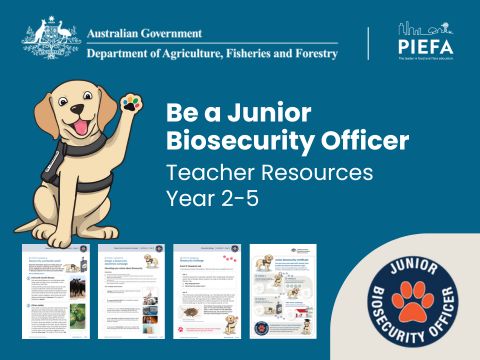Teacher resources on biosecurity
Foster biosecurity champions in the classroom with this new suite of resources developed in collaboration between PIEFA and the Department of Agriculture, Fisheries and Forestry.
The curriculum-linked biosecurity classroom resources provide students with the valuable opportunity to:
- learn about Australia’s biosecurity system
- recognise potential biosecurity threats
- understand the shared responsibility to protect our way of life.
Lesson plans and teacher guides
Lesson plans are designed to boost biosecurity awareness through engaging activities. These plans focus on the Australian Government’s role in biosecurity. They cover topics relevant to children and their families. Topics include:
- travelling within Australia and overseas
- receiving items from overseas through mail or online shopping
- recognising and reporting unusual finds in their backyard.
Explore our Australian Curriculum-based resources for primary students in Years 2–5!

YEAR 2 | Biosecurity Champions
Students will explore the roles of biosecurity measures through discussions and hands-on activities, using scenarios to understand how biosecurity helps to protect Australia’s environment and economy. They will participate in a simulation game that demonstrates the spread of diseases, highlighting the importance of preventive actions during international events. Students will engage in mapping exercises to learn about global biosecurity threats and discuss Australia’s geographical advantages and biosecurity practices that protect the country.
YEAR 3 | Biosecurity Champions
Students will gain an understanding of biosecurity and its importance in protecting Australia’s people, environment and resources. They will understand how pests and diseases impact humans, agriculture and ecosystems. They will learn about biosecurity threats and how various roles, such as biosecurity officers, scientists and government officials, protect the community from biosecurity threats. Students will work together and engage in a problem-solving competition that revolves around the scenario of hosting international events in Australia. They will collaborate in teams to identify potential biosecurity risks and develop effective risk plans, fostering skills in teamwork and creative problem-solving and encouraging them to apply their knowledge in practical, real-world scenarios.
YEAR 4 | Biosecurity Champions
Students learn how pests and diseases spread and the role biosecurity measures play in preventing these threats in Australia. Through engaging discussions prompted by images, videos and worksheets, students will grasp why biosecurity is fundamental to safeguarding Australia’s environment, human health and economy. This activity emphasises the significance of biosecurity in agricultural settings. Students will explore how biosecurity measures prevent the spread of pests and diseases on farms, learning through a scenario-based approach. They will engage in group discussions, develop a biosecurity management plan using action cards and create educational bookmarks summarising key biosecurity concepts. Students will engage in a biosecurity challenge, which highlights some of the biosecurity considerations necessary when hosting international events. The challenge is structured to cater to various learning levels and encourages comprehensive engagement and teamwork.
YEAR 5 | Biosecurity Champions
Students will learn about the significance of biosecurity in protecting people, the environment and agriculture. They will understand Australia’s comprehensive strategies to prevent pest and disease outbreaks, including the various services, organisations and groups tasked with these essential actions. Students will role-play as stakeholders in biosecurity management and design awareness campaigns tailored for primary school audiences. Through this process, they will also gain insights into the spread and movement of diseases and collaborate to solve scenarios, questions and research tasks.
With the addition of a Biosecurity Awareness Campaign Poster, Take Home Challenge and Junior Biosecurity Officer Certificate, this suite of resources will be highly engaging with your students.








